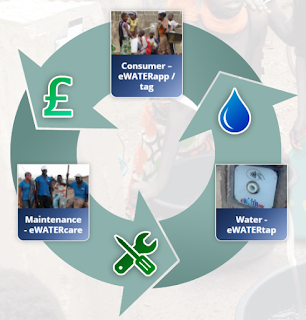New technology and new opportunities
As I was researching gender and
water in Africa and the policies and schemes which were in place to tackle the
problems, I came across eWATER. It very simply aims to supply rural villages
with local and sustainable water sources, this will help tackle the issues of
water collection and all of the problems women and girls endure. 15 years ago
less than 1% of Africans had mobile phones, now 76% have mobile phones, these
people pay for their air time, and to charge their phones, yet many of them
still drink and die from contaminated water. Billions of dollars have been
spent on supplying rural parts of Africa with sustainable water sources; however,
these structures usually break down within six months to two years as the management
is often poor or non-existent. Often the taps are left on, once the tank is
full water gushes out and is available for an hour twice a day. The water that
remains uncontained turns into stagnant water which is a breeding ground for mosquitos
and disease. This lack of time leads to conflict and problems between the
locals as they fight over the water. This problem of water availability affects
young girls whose responsibility it is to collect the water for the whole
family as they may have to miss school or be late as they must collect the
water for their families first.
Money collection is often the
problem for communal water sources, when the money is not collected, there will
be no maintenance in return and thus no sustainable water available. The
problems start with money collection for the water; this is the core of the eWATER
system. They have teamed with mobile phone companies to spread advanced
technologies to the rural areas of Africa. This low cost solution works by
people buying eWATER credits on the app on smartphones, or if they do not have
smart phones they can buy credits from a eWATER seller. They then use a eWATER tag
which contains their credits, they tap this tag on the contactless pad on the
water pumps and the water is dispensed. The water is available 24 hours a day,
enabling the locals to have full time availability to their local water source.
These water sources are
maintained as they are receiving the money when the water is dispensed, the pumps
are connected to the eWATER servers via the internet and cloud. This enables
alerts to be sent to local engineers who often get the pumps fixed and working
again in 30-60 minutes as it is shown in the cycle in the image. Many women and
girls have been educated and trained to become the engineers and technicians so
eWATER can hire them, thus allowing them to get a fair wage and promote gender
equality in rural parts of Africa.
From my research of eWATER I have
found it to be a key driver in the fight for gender equality regarding water
and water collection. The introduction of these pumps in thousands of rural
villages across Africa will considerably drop the distance that girls and women
have to travel for water. This will then have a knock on effect for the women’s
health as I have stated in my precious blogs that carrying large amounts of
water across large distances can have long term health impacts as well as short
term problems. The 24 hour availability of water will mean that girls no longer
have to miss school waiting for water to be available, they can simply collect
the water before or after school. Not only does this system have a positive
impact on the girls and women collecting the water but also managing the water
systems. Girls and women are being trained and hired in something they have
vast knowledge on and are keen to develop.
References:
eWATER. Available:
http://www.ewaterpay.com/About. Last accessed 20th Dec 2017.
Lien,
K. (2017). Pay as you drink. Available:
https://www.economist.com/news/middle-east-and-africa/21717766-innovative-cure-broken-pumps-better-way-provide-drinking-water.
Last accessed 20th Dec 2017.

Hi! I have enjoyed following your blog and found this post particularly interesting. I completely agree with you, eWATER is a key driver in the fight for gender equality. You have discussed some of the problems relating to this method and how they can be overcome which was also interesting. After researching eWATER, it seems that they are not having a problem with collecting revenue and are expanding rapidly (The Economist, 2017). Would you agree that schemes, such as eWATER, should expand in order to spread its positive impacts? If so, do you see any problems that could arise in the future with regards to wider use, e.g. infrastructure deterioration?
ReplyDeleteI am in agreement with Bailey, the economist mentions that they don't have any problems with collecting water. Following on from Bailey's comment, how will eWater tackle drought? Because if there is a drought, and therefore less readily available water how will they keep providing water? Additionally, if demand for water grows as eWater services grow how will they reliably provide water and while it means women may have to walk less far to collect water, by having to queue for a long time it still reduces precious time they could be using for other activities such as leisure, or adult education.
Delete